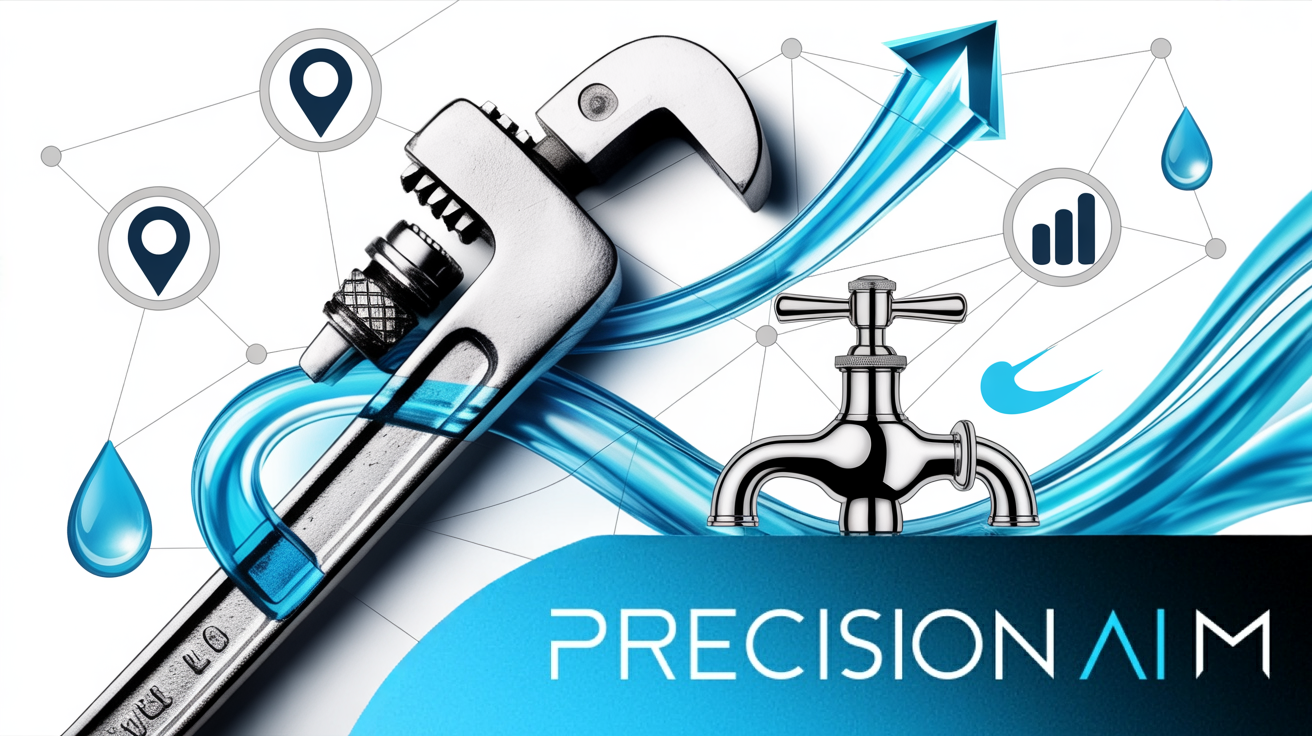Getting found online when someone’s pipes burst or boiler fails isn’t just luck—it’s about showing up at the right moment. Most plumbers I’ve worked with struggle to appear in urgent local searches, especially when big directories dominate the results.
I know how frustrating it is to lose leads to competitors simply because your business isn’t visible in the Map Pack or organic listings. The good news is, there are proven steps you can take to boost your rankings and attract more calls from real customers.
In this guide, I’ll break down exactly how plumbing SEO works, why it matters, and which strategies deliver the best results. You’ll get actionable tips for optimising your website, managing reviews, and using the right tools—plus real-world case studies that show what’s possible.
Whether you’re a solo plumber or run a busy team, you’ll learn how to avoid common mistakes and build a cost-effective SEO plan that keeps your phone ringing. Let’s get started on making your business the first choice for local plumbing emergencies.
What is SEO for plumbers?
Definition and Purpose of Plumbing SEO
Plumbing SEO, or Search Engine Optimisation for plumbers, is about helping your business appear when locals need you most—often during emergencies. Unlike generic SEO, it targets customers actively searching to book, using phrases like “emergency plumber near me” or “boiler repair London”.
You need more than hope to get found. Set up clear service pages and area landing pages so Google directly links urgent local enquiries to you, not the competition.
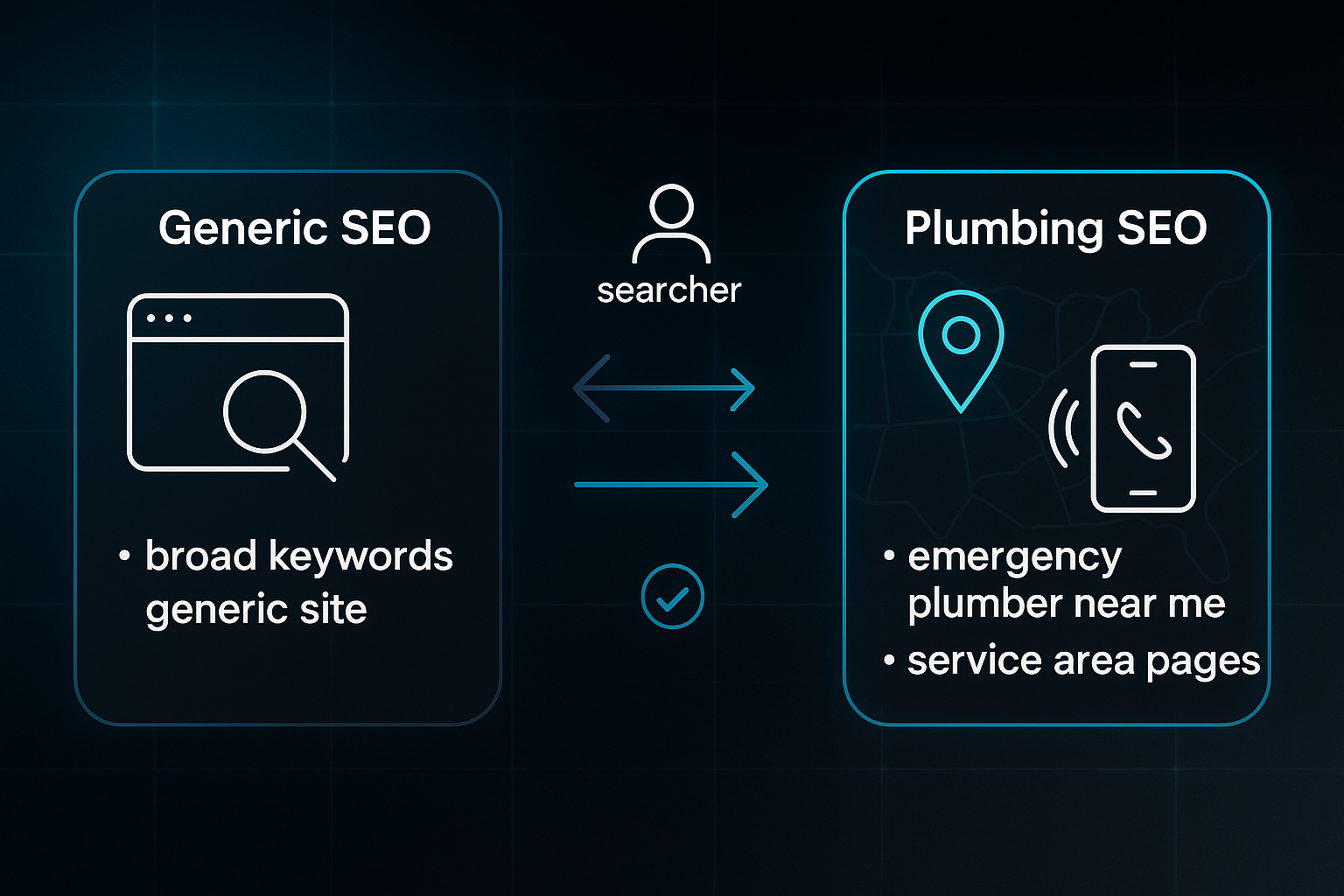
Customising SEO for Plumbing-Specific Keywords and Local Intent
This is where plumbing SEO really stands out: keywords are crucial. The goal is to rank for searches like “24 hour plumber [city]” or “blocked drain near me”, blending urgency and location.
Phrases such as “open now” or “fast” indicate you’re ready for emergencies, while local place names confirm your service area. This approach attracts both urgent repair calls and routine enquiries.
Core Ranking Goals and Lead Generation Opportunities
So, where do people actually click? It’s all about the Google Map Pack—that three-business box at the top of local results. Almost 44% of clicks happen here.
Want those calls? Prioritise:
- Optimised Google Business Profile
Regular updates and full details build trust and raise your ranking. - Consistent NAP Information
Name, Address, and Phone must match everywhere online for local authority. - Positive Reviews
Recent, glowing reviews help you stand out and convince anxious callers. - Clear Service Lists
Make your services easy to spot so Google and customers match needs quickly.
Industry-Specific SEO Challenges for Plumbers
Now for the challenge: big directories like Checkatrade and Rated People often crowd out independent plumbers with their strong SEO presence. You fight back with hyper-local content, area-based pages, and collecting plenty of reviews.
When there’s water everywhere, customers expect immediate action and clear signals they can trust you. If your site doesn’t show this up front, you’ll get overlooked.
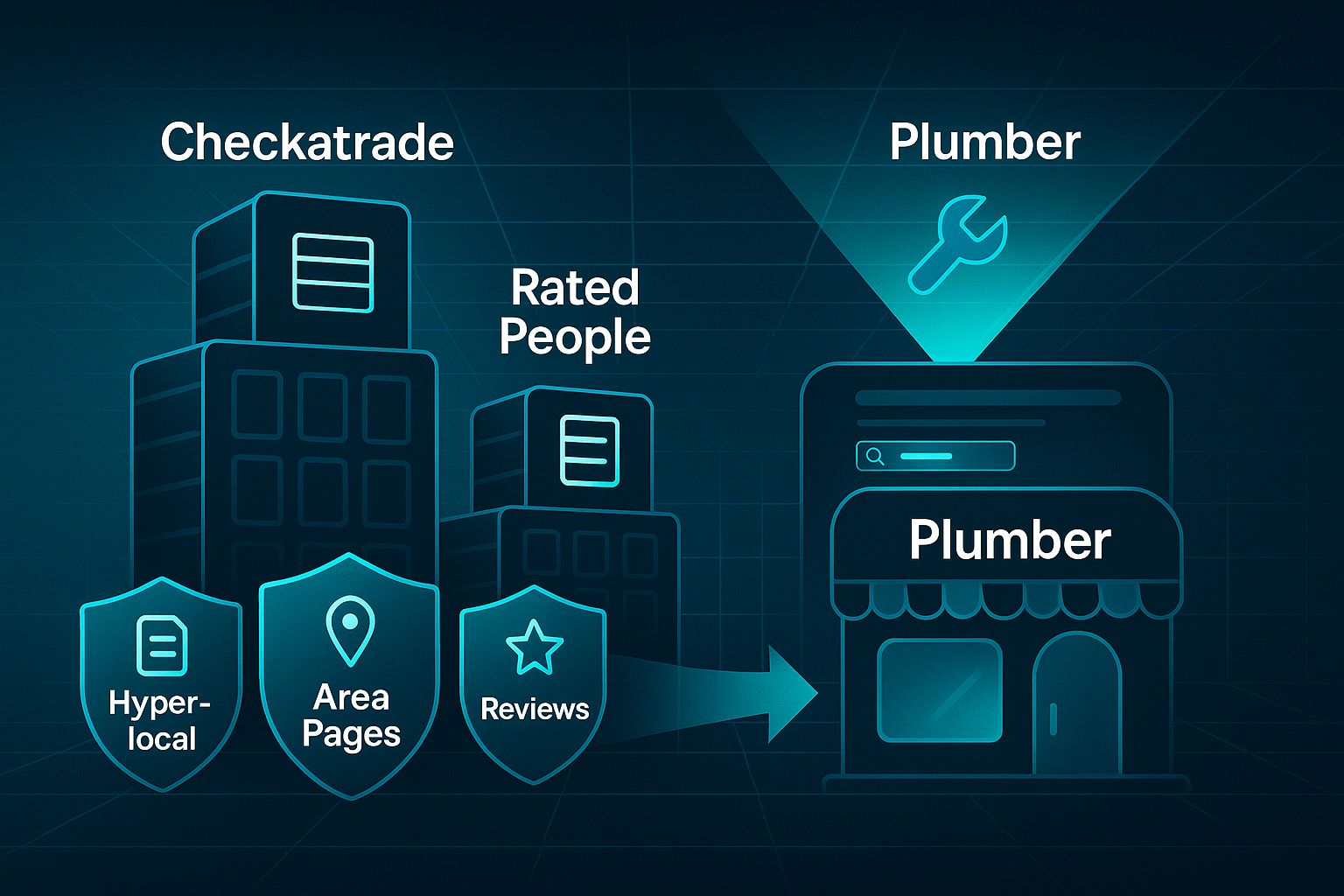
Urgent Search Intent and Customer Expectations
Your website should load quickly, offer click-to-call, and lead with trust signals like great reviews and authentic team photos. In emergencies, the quickest and most credible business wins out.
With 82% of emergency service calls originating from mobile devices, lightning-fast loading speeds are not just a preference but a crucial component of a mobile-first trust strategy.
Real-World Customer Journey Scenario
Imagine: a burst pipe in Manchester. The homeowner searches “emergency plumber near me,” spots a Map Pack listing with five-star reviews and “open now,” then calls immediately. Job secured.
Linking Challenges to Opportunities
Focusing on these essentials—local keywords, strong reviews, and instant credibility—pays off. One West London firm followed this strategy and enjoyed a 37% increase in leads and 55% more local calls within three months.
Keep everything updated and you’ll win more emergencies and see long-term growth.
Why SEO matters for plumbing businesses
Customer Acquisition and Growth Benefits
Let’s be honest—if you want leads for plumbing, SEO is your lifeline. Most new clients won’t dig through adverts or ask their neighbours anymore; they’ll turn to Google in a moment of crisis.
Did you know that over 60% of new plumbing leads pop up from that Google Map Pack? And another 25–30% come in through organic search listings.
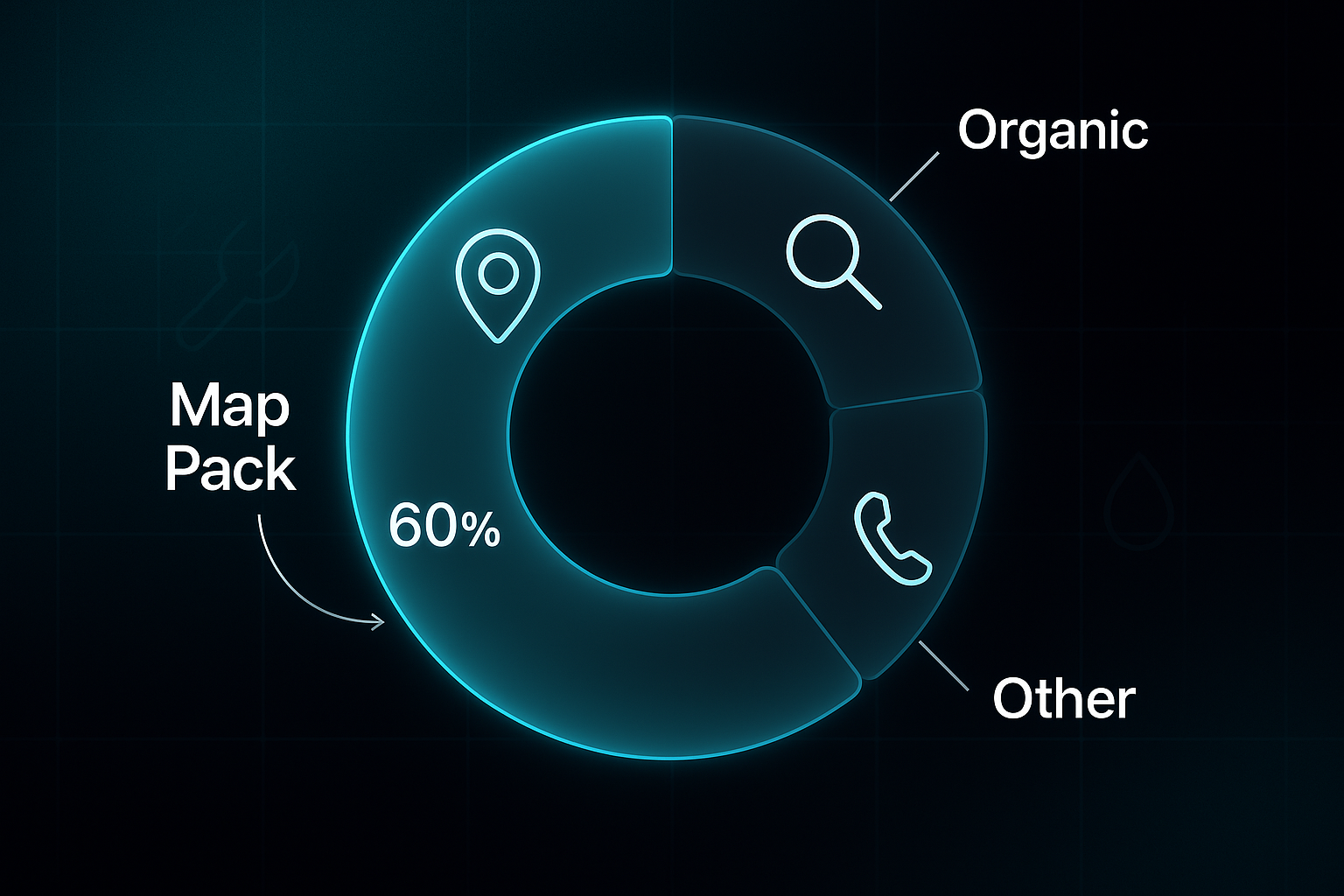
When people search urgent things like “plumber near me,” their intent is sky-high—they’re ready to click, call, and book on the spot.
That means SEO delivers not just more leads, but better leads—calls and bookings with real urgency. These are far more genuine than what you’ll get from paid marketing or generic directories.
Leads from SEO are often more qualified and have a higher intent to purchase than leads from PPC.
Here’s the thing about SEO for plumbers: the results stack up over time. It’s not about one-off campaigns that fade after a few weeks. Every tweak you make—whether it’s local service pages or fresh Google Business Profile updates—builds on what came before.
There’s evidence in the numbers. One plumbing business saw a 62% boost in monthly bookings by focusing on local SEO tweaks. Another firm jumped into the top Map Pack position and reaped a 29% rise in monthly calls, not to mention a 22% jump in bookings.
You make little improvements and suddenly, the phones don’t stop ringing.
SEO vs. Paid Advertising and Directories as a Traffic Channel
But what about paid ads or directories—do they even compare?
Here’s a quick snapshot: Map Pack and organic results dominate, not just in numbers but in trust. Top Map Pack spots snag a 35–45% CTR, and if you’re number one for urgent keywords, you’ll see over 50% CTR.
Paid ads, meanwhile, limp along with just 3–7% CTR, and directories do even worse—think 2–5% CTR.
Why is that? SEO lets you control your online reputation—your reviews, your messaging, your credibility. Paid ads end when your budget runs out. Directory listings? They’re less trusted and easy to ignore.
| Channel | Share of Leads | Avg. CTR | Lead Quality | Long-Term Value |
|---|---|---|---|---|
| Google Map Pack | 60%+ | 35–45% | Very High | Compounding returns |
| Organic SEO | 25–30% | 15–25% | High | Sustained growth |
| Paid Ads | 10–15% | 3–7% | Medium | Stops if paused |
| Directories | <10% | 2–5% | Low–Medium | Declining |
So if you’re a plumber weighing how to grow fast and keep costs down, it’s no contest.
Plumbers doubling down on local SEO regularly double or triple their ROI compared to only running ads. Because with SEO, your lead cost drops, bookings ramp up, and reputation grows—year after year.
Local SEO strategies and essentials for plumbers
Key Local Ranking Factors
Local SEO for plumbers is all about targeting urgent customer intent and specific service areas. People searching for help often want someone close by, right now.
The best way to catch these leads? Create landing pages for every main area you cover and use local keywords like “emergency plumber [place]”. Each page should feel tailored and show you really know these neighbourhoods.
Highlight what’s unique—add trust signals like accreditations and up-to-date reviews. Plumbers who do this consistently enjoy more organic leads and improved Map Pack positions.
Leverage third-party validation by strategically integrating Google reviews, industry-specific platforms like HomeAdvisor and Angi, local business awards, and verification information.
Your Google Business Profile plays a crucial role. Make ‘Plumber’ your primary category and add secondary services carefully. NAP consistency—that’s your Name, Address, Phone—is vital. If you slip up, even once, your ranking can drop.
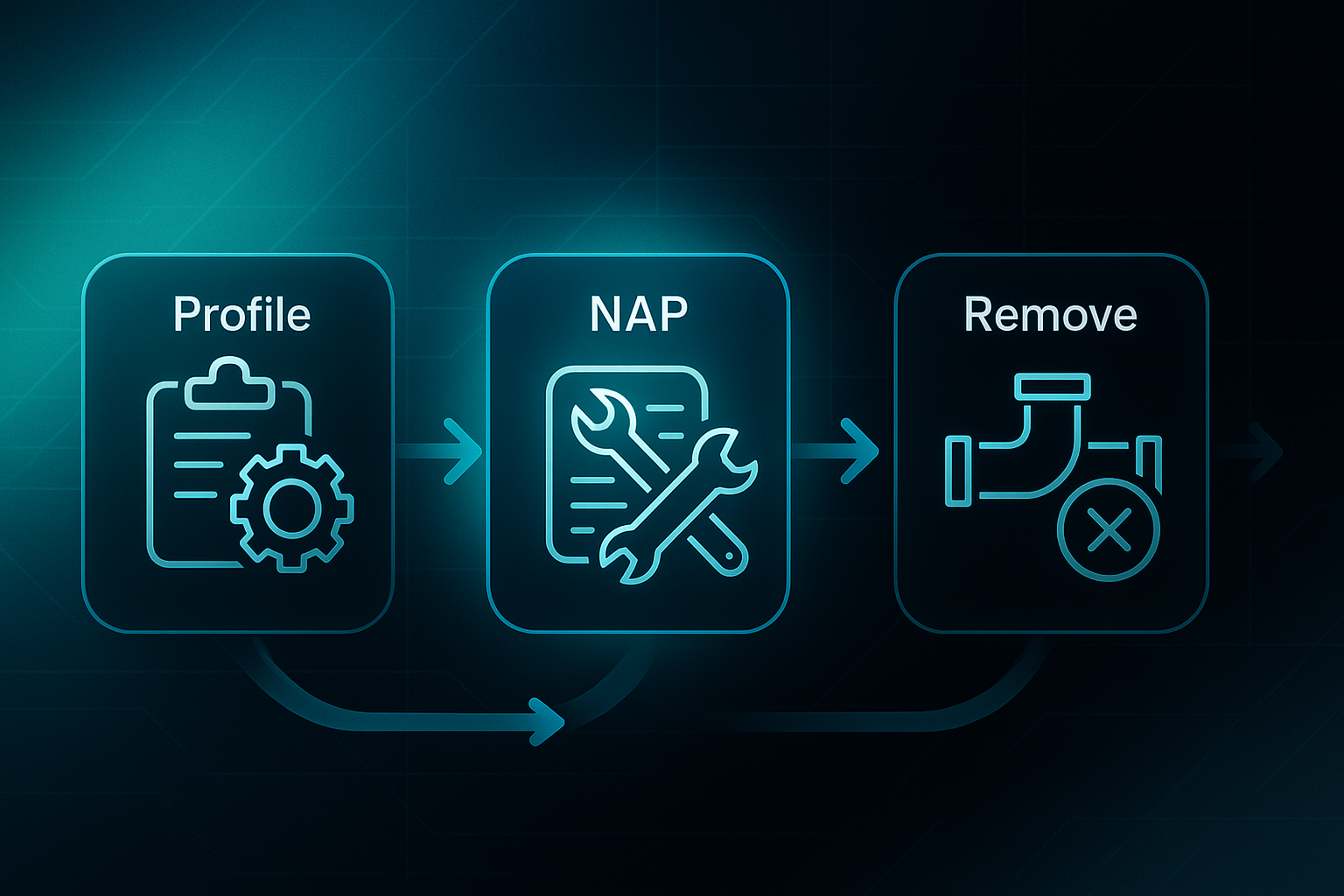
Remove duplicates or old listings so the right details stand out with no confusion. A single, trustworthy profile will attract genuine enquiries.
Having accurate citations on trusted directories boosts local authority. If your business details change, update every listing you find—don’t let old information linger online.
Consistent citations mean better Map Pack rankings and more calls. Think of them as building blocks supporting your reputation.
Review and Reputation Management
Here’s the thing—reviews matter hugely. Win more bookings by increasing honest reviews, and automate requests after every job with SMS, emails or polite reminders.
Plumbers using several methods regularly see their reviews double in a year. More reviews often lead to a rise in bookings.
Detailed, recent reviews mentioning specific services and locations increase trust and boost rankings. The fresher and more relevant, the better.
Reply quickly and personally to every review. This shows professionalism and signals you care. It also nudges your Map Pack ranking upwards.
Recent Trends in Local SEO
The Google Map Pack is where most customers find plumbers. Mobile searches drive the numbers, so your site must be mobile-friendly with click-to-call options.
Schema markup—think LocalBusiness, Review or ServiceArea—is vital for boosting both Map Pack and organic results. Add hyper-local content for even greater impact.
- Map Pack Visibility
Featured plumbers see up to 90% more enquiries by appearing in the Map Pack. - Mobile Search
Over 60% of local plumbing profile visits come from smartphones. - Review Impact
100+ reviews can mean 50% more calls. - Schema Importance
Schema markup is essential for local and AI-based searches. - Booking Boost
Actively engaging with reviews increases bookings by around 30%.
Actionable SEO steps for plumbers: A complete walkthrough
You know what throws most plumbers when they tackle SEO? It’s all the things vying for attention—websites, keywords, reviews, listings, tech fixes. But you don’t have to do everything. Focus on what brings real results, one step at a time.
Think of it like fixing a leak: patch one spot, then the next, until everything’s dry.
Optimising Your Plumbing Website
Your website is your digital HQ. Start with site structure that gets people calling or booking right away.
Bold “Call Now” and “Book Online” buttons belong at the top of every page—crucial for mobile. If someone’s in a panic about a burst pipe, they need help instantly.
Navigation must be simple and direct. Don’t give visitors a maze. Every second counts when there’s water everywhere.
Make sure your site works beautifully on mobile. Most plumbing emergencies come from people using their phones. Compress images, enable caching, and consider a CDN to guarantee things load fast.
Show trade badges, accreditations, and genuine photos. Include your service area and reviews to cement trust from locals.
Keep forms short and sweet. And with click-to-call, you’re only one tap from the next job.
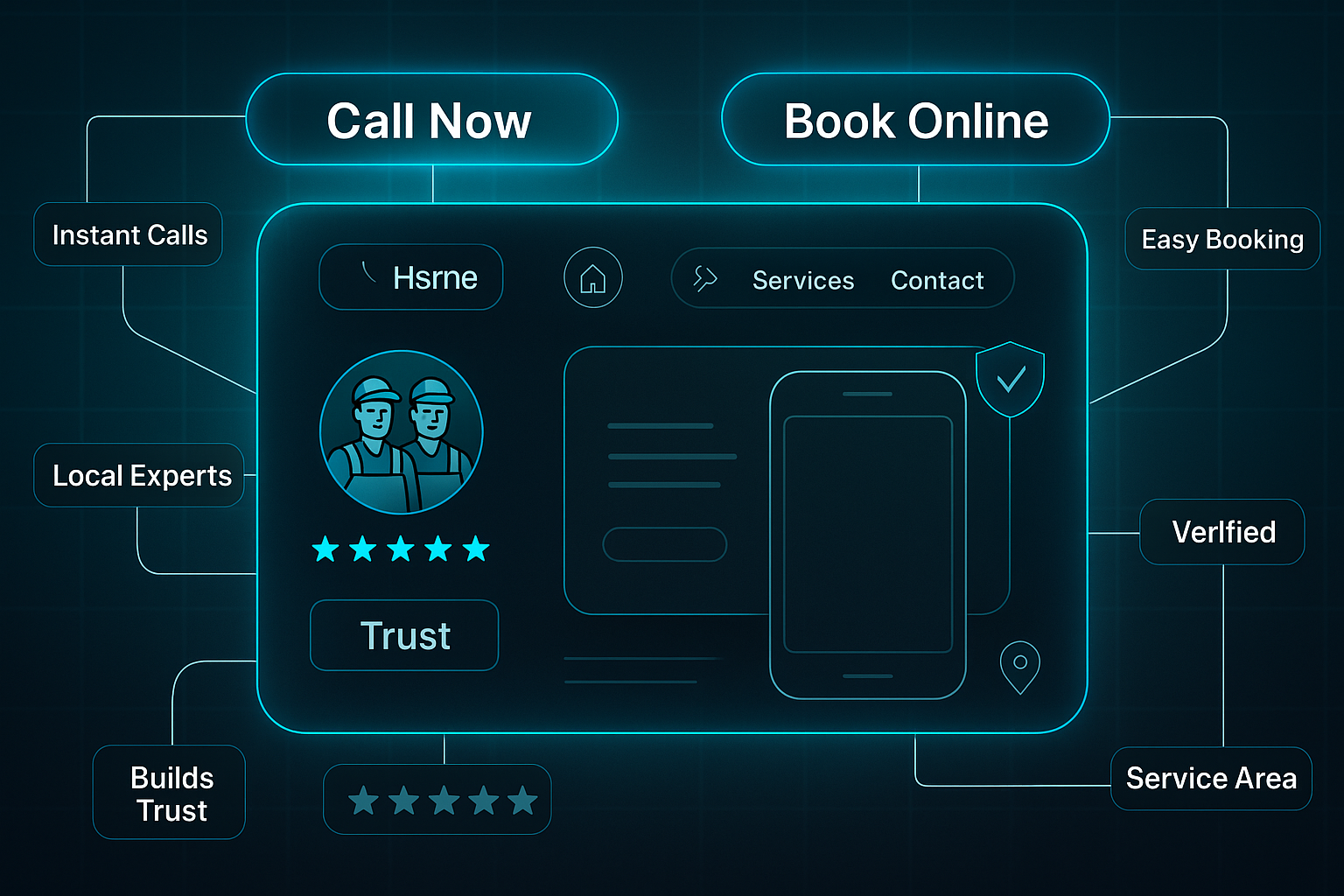
On-Page SEO Tactics
Next, what about what’s actually on your site? This is where local keyword research wins.
Target search terms your customers would use—like “emergency plumber Leeds” or “bathroom fitting London.” Use Google Suggest and glance at top local competitors for ideas.
Build separate landing pages for each key service and every main location. Each should feel personal, not copy-pasted. Add relevant reviews to prove local experience.
Put your core service and location in every page title and meta. Organise with keyword-rich H1 and H2 headings. Google—and customers—appreciate this clarity.
Enhance with FAQs from real customer questions, descriptive alt text for images, and recent reviews on your main service pages.
Off-Page SEO Essentials
Want to be the go-to plumber in town? You need strong backlinks and bulletproof details online.
Write guides or short “how-to” videos—useful content naturally gets links. Spot broken links on local partners’ sites, then offer your content as a solution.
List your business everywhere it matters. Keep your name, address, and phone (NAP) details 100% identical everywhere. One mismatch: you might lose rankings and trust.
Collect reviews after every job—set up automated reminders. Reply to every review, pro or con, and mark them up with schema so Google shows your stars up front.
Technical SEO Best Practices
Behind the scenes, technical SEO keeps things running.
Use schema markup for LocalBusiness and your main services. This helps Google “see” you more clearly and can boost Map Pack visibility. Your website should be secure—HTTPS is now expected and earns a ranking boost.
Compress images, use caching, and guarantee every page is mobile-friendly. Submit a sitemap, ensure robots.txt isn’t blocking key pages, and monitor Google Search Console for issues.
Track your keyword rankings and leads. Make small, regular tweaks—they pay off over time.
Creating and Marketing Content
Showcase your know-how. Add customer maps, before-and-after images, and glowing reviews on every important page.
Blog about local plumbing issues, seasonal fixes, or common problems in your community. This sort of content not only builds trust but gets people calling you.
Feature case studies and video testimonials—let future clients hear your story from satisfied locals.
And finally, keep everything fresh. Regularly update core pages, add fresh posts, and review your FAQs so your site never feels forgotten.
Stick to these practical steps—one at a time—and you’ll start seeing more calls, stronger rankings, and a growing reputation across your service area.
Common SEO mistakes plumbers should avoid
Frequent Pitfalls and Consequences
Let’s talk about those all-too-common SEO mistakes plumbers stumble into. Duplicate profiles and directory listings—plus mismatched NAP (Name, Address, Phone) info—are a major cause of lost Map Pack visibility and confused customers. Ever had your number slightly wrong online? Even a tiny error can get your listing bumped down by Google, sometimes removed altogether.
If you don’t keep your website and Google Business Profile current, your search rankings slide and customer queries dry up. A plumbing business can lose up to 60% of online bookings when main pages go stale or don’t pitch local services clearly.
Thin content—empty service pages or duplicate text—won’t cut it for urgent searchers or with Google’s ranking systems. Then there’s keyword stuffing and spammy backlinks, a recipe for disaster. Get flagged by Google’s anti-spam tech and your traffic drops off a cliff.
Mobile matters more than ever. If your site loads slowly or makes life difficult on a smartphone, you’ll lose nearly all those 90% of plumbing searches that happen on mobile devices. Customers facing a crisis aren’t waiting.
Self-Audit Checklist for Plumbers
So, how do you spot these slip-ups before you lose leads? Use this quick self-audit:
- Google Business Profile Integrity
Remove duplicates and confirm information is current. - NAP Consistency
Make sure your Name, Address, and Phone match everywhere. - Content Quality
Update old pages and add local, recent posts. - Keyword Use
Use keywords naturally; avoid overload. - Backlink Health
Disavow dodgy or irrelevant backlinks. - Mobile Usability
Guarantee quick loading and easy click-to-call forms. - Review Activity
Gather regular positive reviews and reply quickly.
Sort these basics and you could see rankings and calls jump by 30–60% in just months. Small steps, big wins.
Best SEO tools and resources for plumbers
Top Self-Serve and Local SEO Tools
Let’s face it—if you want fast results and the ability to control your own online fate, self-serve SEO tools are your best friend. For plumbers, it all starts with Google Business Profile. This free tool is the linchpin for showing up in urgent local map listings, which are where a huge chunk of bookings come from.
Tools like BrightLocal and Moz Local make a daunting job easier by automatically fixing your business listings, tracking reviews, and keeping your citations updated everywhere they count. That’s the type of streamlined management you need to stay on top of the Map Pack.
If you’re just starting out or run a smaller plumbing firm, Whitespark is great for quickly building up your citations and boosting your local authority. And for WordPress users, plugins like Yoast SEO and Rank Math are handy for site check-ups, fixing mobile issues, and streamlining on-page optimisation—all without needing to hire someone.
Keep in mind: if you’re manually updating trade directory listings, regular NAP checks (name, address, and phone) are absolutely vital. Just one small mismatch could knock you out of those crucial emergency search rankings.
Managed Services and Automation Platforms
Maybe you’re flat out with jobs and can’t keep up with daily SEO tweaks. That’s when managed automation steps in. SEOSwarm brings AI-powered research, tailored local content, Map Pack updates, and automatic review management—perfect for plumbers where speed and reputation really make a difference.
There’s even the Blog-in-one-Minute add-on for rapid blog creation across all your service areas, though it’s a separate subscription. Managed platforms like these keep pace with your busy season, expansion, or those awkward regulatory changes, all while taking the grunt work off your plate.
You get better quality outcomes and more leads fast—but give up a bit of day-to-day control.
Tool Comparison and Selection Tips
So how do you choose? Match your SEO tools to what stresses you most—do you get floods of urgent calls, tons of reviews, or regular business info changes?
DIY options like Google Business Profile or BrightLocal suit owner-operators who want control at a low cost. Those needing less hassle and more rapid results might prefer managed services like SEOSwarm, especially when demand can spike overnight.

AI-Powered Content Strategy
See the AI platform that's replacing entire content teams (with better results).
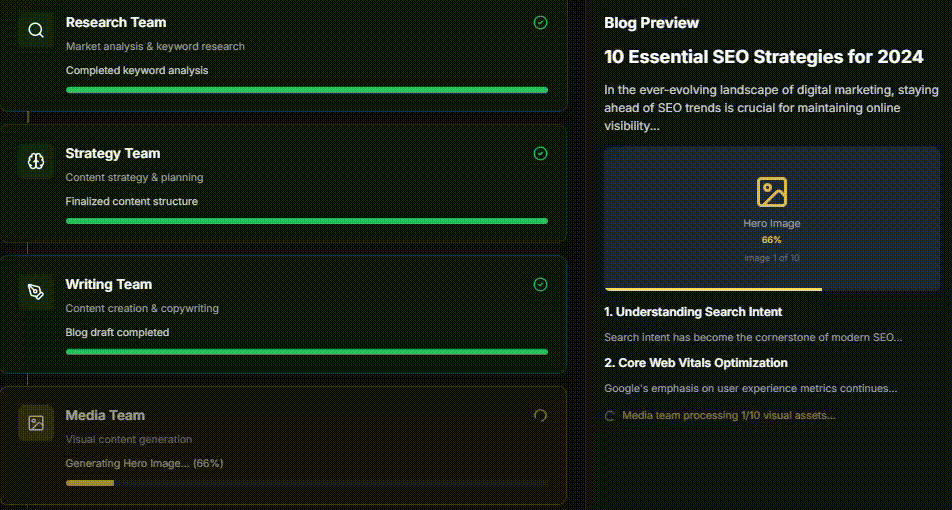
Bigger firms, or those dealing with tricky local plumbing challenges, could do well with specialist agencies or high-end platforms. The best approach? Blend automation with some expert guidance and make sure local listings are always spot-on. That way, you stay trusted and visible in every plumbing emergency.
Tracking, measuring, and improving SEO for plumbers
Key Metrics and Analytics
Getting plumbing SEO right means tracking results all the way. The real story starts with top 3 keyword rankings for your urgent services—aim for 20–50 main local spots. But how do you know if traffic is healthy? Small firms should see 500–2,000 monthly organic visitors, and conversion rates nearly always outperform other industries at a solid 14.6%.
Here’s something you can’t ignore: Google reviews. A steady 5–10 new ones every month builds trust and bumps your rank. For the Google Business Profile, expect 2,000–5,000 monthly impressions and, if you’re in a busy area, 100–300 direct calls each month.
Google Analytics 4 shows which service pages win jobs, and Search Console uncovers high-impact keywords and technical gremlins. Growth looks like more web visitors, increasing leads and reviews, plus more calls. If numbers dip or stall, take notice—it’s a sign to act.
Actionable Improvement Strategies
So, what practical SEO tweaks should be on your list? Run monthly site audits—check speed, mobile experience, schema, and fix any broken links pronto. Expanding your service zones? Build fresh landing pages and watch their performance via GA4.
Regularly test which buttons (“Book Now”, “Call 24/7”) land more jobs and push conversions past that 14.6% average. After every job, collect feedback—then use it to inspire new FAQs and content topics.
And keep eyes open for search trends, like “heat pump installation”. Refresh keywords and pages each quarter, staying competitive and relevant in every local emergency.
Advanced and localised SEO strategies for plumbers
Geo-Targeting and Local Content Optimisations
Curious why certain plumbers always turn up first in local searches? It’s all about geo-targeting. By building unique landing pages for every city, suburb or postcode—think “/emergency-plumber-bristol”—you’re telling Google exactly where you want to be found.
The trick is in the details: put the area name in your page title, meta, headers, and URL. Add customer testimonials, embed Google Maps, plus area-specific FAQs. Don’t forget smart schema markup—LocalBusiness, Service, Review and ServiceArea—to help boost your Map Pack visibility.
Go hyperlocal and you’ll likely see up to 45% more bookings with a 20–30% increase in keyword visibility. Posting updates, job photos or special offers weekly on your Google Business Profile also keeps you front-of-mind, with a 15–28% rise in website visits and calls.
Proactive Maintenance and Monitoring
But here’s the thing—you can’t just set it and forget it. To stay ahead, automate review requests after every job so genuine feedback keeps rolling in.
Run monthly listing audits with BrightLocal or Moz Local to ensure your business details are always spot-on, removing any duplicate or outdated info.
Give your landing pages a refresh each quarter, updating FAQs and details in line with seasonal jobs or real customer feedback. Keep an eye on competitors using SEMrush or Ahrefs; filling local keyword gaps can actually double your leads.
One Bristol plumber grew bookings 30% simply by updating local FAQs and keeping Google Posts consistent. With steady tweaks, your local SEO won’t just keep up—it’ll stand out.
Blog-in-one-minute
Add a fully SEO-optimised blog to your website with just 2 lines of code.
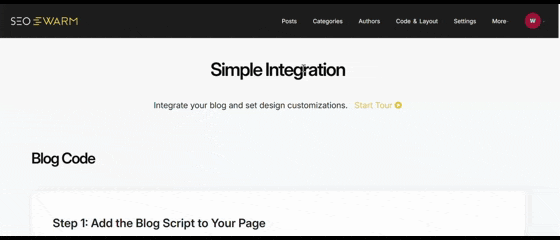
Cost-effective SEO solutions and ROI for small plumbing businesses
High-Return, Low-Effort Strategies
For small plumbing firms, every pound matters—so focus on SEO fundamentals that show the fastest impact. The basics still win: optimising your Google Business Profile, keeping citations accurate, fast-loading websites, and active review management are proven ways to grow bookings. If you’re busy, platforms like SEOSwarm can automate these essentials, making results come easier.
- Citation Accuracy
Correct listings for a 10–18% lift in local search impressions within two months. - Google Business Profile Optimisation
Stay updated and reply to feedback to gain 30–45% more bookings in 3–6 months. - Site Speed Fixes
Speed up your site to under three seconds and enjoy 22–28% more calls in ninety days. - Review Management
Proactive reviews and replies spark a 35–50% jump in fresh monthly leads. - Role of Managed Solutions
SEOSwarm automates listings and technical checks, typically delivering 25–40% more qualified leads over half a year.
Making Smart Investments in SEO
So, why spend big on ads? SEO now outperforms ads for cost-per-lead and lead quality. By updating GBP, reviews, and citations (DIY or managed like SEOSwarm), plumbers unlock affordable, long-term growth.
Real-world SEO case studies and success stories from plumbing businesses
Lead Generation and Visibility Gains
Plumbers want evidence, not empty promises. Here’s a real example: a Midlands family plumbing firm teamed up with Trade Design for a local SEO push in 2024. Their monthly enquiries doubled from 20 to 40, and website traffic climbed 35% in less than a year.
How did they do it? They nailed three things: optimised their Google Business Profile, created tailored landing pages for every area, and posted regular project photos. They also sent structured review requests and grew reviews from 22 to 55, bumping up their average score from 4.3 to 4.7—earning a prized Map Pack slot.
A New York drain service also nailed organic bookings with a 41% jump in just six months. They fixed GBP details, launched city-specific landing pages, and made mobile speed a priority. It all boiled down to technical tweaks, local content, and keeping their profile fresh.
Lessons Learned and Replication Tips
- GBP Optimisation
Keep photos, offers, and contact details consistently updated. - Local Landing Pages
Build a unique, keyword-rich page for each neighbourhood. - Technical Upgrades
Turbocharge mobile speed and add local schema markup. - Structured Reviews
Ask every customer for feedback and always reply.
These strategies push you up the Map Pack and drive new bookings within 6–12 months—moves any plumber can action right now.
My Final Advice on SEO for Plumbers
Most plumbers don’t lose leads because they lack skill—they lose them because they’re invisible when it matters most. Local SEO isn’t about chasing every trend; it’s about showing up, fast, for the people who need you right now.
Here’s my advice: Start with the basics—optimise your Google Business Profile, keep your NAP details spotless, and collect fresh reviews after every job. Build out area-specific landing pages and make sure your site loads quickly on mobile. If you’re pressed for time, use tools or managed services to automate the grunt work.
SEO for plumbers isn’t a one-off fix; it’s a habit. The plumbers who win are those who keep their online presence as sharp as their tools. Show up, stay current, and your phone won’t stop ringing.
- Wil
